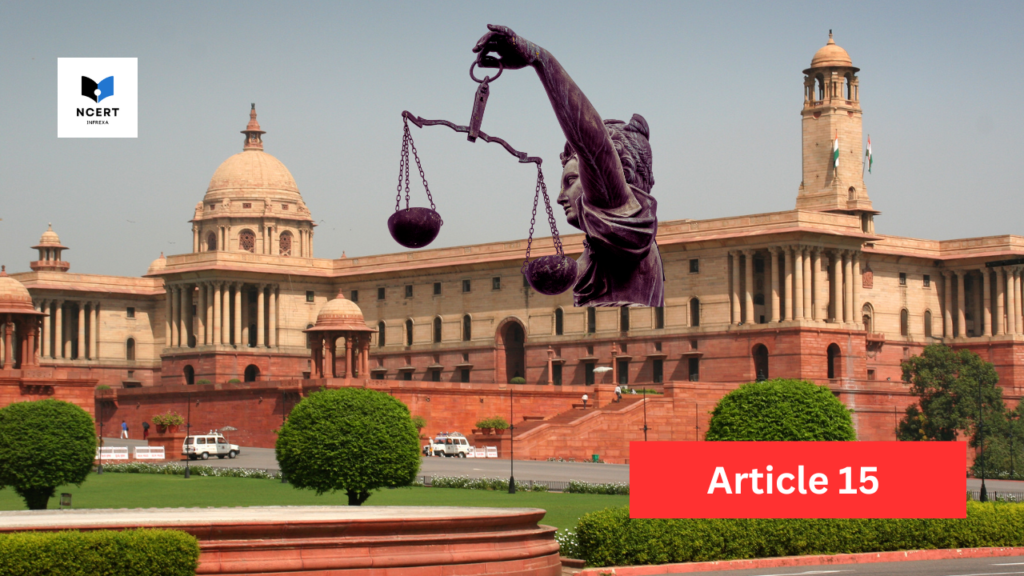Article 15 of the Indian Constitution is a cornerstone of our fundamental rights, ensuring equality and prohibiting discrimination on various grounds.
It is essential for understanding social equality and legal protections in India.
What is Article 15?
Article 15 of the Indian Constitution guarantees equal rights to all Indian citizens and prohibits discrimination based on caste, sex, race, religion, or place of birth.
It is enshrined in Part III (Fundamental Rights) of the constitution and complements Articles 14, 16, 17, and 18.
Key Points
- Equality without Discrimination: Article 15(1) ensures that the state cannot discriminate against any citizen based on caste, religion, sex, place of birth, or race. This fundamental right aims to uphold the dignity of every individual and promote inclusivity.
- Access to Public Places: Article 15(2) mandates that all Indian citizens have the right to access public places such as shops, hotels, and entertainment venues without discrimination based on caste, religion, sex, etc.
- Special Provisions: While all citizens are equal under the law, Article 15(3) allows for special provisions to be made for women and children. This includes measures like reservations in education and employment to address historical inequalities.
- Affirmative Action: Article 15(4) empowers the state to make special provisions for socially and educationally backward classes, including Scheduled Castes (SC), Scheduled Tribes (ST), and Other Backward Classes (OBC). These provisions aim to uplift marginalized communities and promote social justice.
- Economic Reservation: With the addition of Article 15(6) through the 103rd Constitutional Amendment Act, 2020, the state is mandated to provide reservations for economically weaker sections (EWS), irrespective of caste or religion. This ensures equitable opportunities for all sections of society.
Key Cases and the Role of the Judiciary
Here are key cases illustrating the application and interpretation of Article 15 of the Indian Constitution:
1. State of Madras v. Champakam Dorairajan (1951)
- This landmark case was the first major challenge to caste-based reservations in educational institutions.
- The Supreme Court held that caste-based reservations violated Article 15(1) as they discriminated against individuals on the basis of caste.
- However, this decision led to the First Constitutional Amendment in 1951, which introduced Article 15(4), allowing for reservations in educational institutions.
2. Indra Sawhney v. Union of India (1992)
- This case challenged the Mandal Commission recommendations for 27% reservations for Other Backward Classes (OBCs) in government jobs, in addition to existing quotas for SCs and STs.
- The Supreme Court upheld OBC reservations but introduced several key stipulations:
- Total reservations cannot exceed 50% to preserve meritocracy.
- The “creamy layer” (economically advanced members within OBCs) should be excluded from reservation benefits.
- The government must establish a permanent commission to identify backward classes.
- The Indra Sawhney case created a complex framework for reservations. It reaffirmed the state’s power to implement affirmative action policies under Article 15(4) but balanced this with other constitutional principles.
3. M. Nagaraj v. Union of India (2006)
- This case addressed the issue of providing reservations in promotions for Scheduled Castes and Scheduled Tribes (SC/ST) employees.
- The Supreme Court upheld the constitutional validity of providing reservations in promotions under Article 16(4A), subject to certain conditions such as the collection of quantifiable data to demonstrate backwardness and inadequacy of representation.
- The judgment clarified the parameters for implementing reservations in promotions while ensuring efficiency in public administration.
4. Navtej Singh Johar v. Union of India (2018)
- This case challenged the constitutionality of Section 377 of the Indian Penal Code, which criminalized consensual homosexual activity.
- A five-judge bench of the Supreme Court struck down Section 377, declaring it unconstitutional. The judgment held that it violated Articles 14, 15, 19, and 21 of the Constitution (equality, non-discrimination, freedom of expression, and right to life and liberty).
- This landmark decision:
- Decriminalized homosexuality in India.
- Recognized sexual orientation as a protected characteristic under Article 15.
- Affirmed the right to privacy as a fundamental right.
- Expanded the interpretation of equality and personal liberty under the Indian Constitution.
These key cases highlight the evolving interpretation of Article 15 and its role in addressing various forms of discrimination in Indian society, including caste-based discrimination, reservations, and the rights of marginalized communities.
By adjudicating matters related to caste-based discrimination, reservations, and the rights of marginalized groups, the judiciary, has played a critical role in upholding fundamental rights and protecting marginalized communities, even when facing strong societal resistance.
Challenges and Controversies
Despite constitutional provisions like Article 15 and related laws such as the Scheduled Castes and Scheduled Tribes (Prevention of Atrocities) Act, 1989, caste-based discrimination persists in various forms across Indian society.
Films like “Article-15” shed light on these issues, sparking discussions and debates.
Relevant Legislation
Several laws complement Article 15 to promote equality and protect the rights of marginalized groups:
- Protection of Civil Rights Act, 1955: Enacted to abolish untouchability and punish its practice.
- Scheduled Castes and Scheduled Tribes (Prevention of Atrocities) Act, 1989: Aimed at preventing crimes against marginalized communities and ensuring their welfare.
- Rights of Persons with Disabilities Act, 2016: Provides comprehensive protections and rights for persons with disabilities, aligning with the principles of equality.
- Maternity Benefit Act, 1961: Ensures maternity benefits and workplace protections for women, promoting gender equality.
- Sexual Harassment of Women at Workplace Act, 2013: Safeguards women’s rights in the workplace and addresses gender-based discrimination.
Conclusion
Article 15 of the Indian Constitution embodies the principles of equality and social justice. While significant progress has been made, challenges persist, necessitating continued efforts by the government and society to ensure the full realization of these rights for all citizens.
By upholding the spirit of Article 15 and enacting complementary legislation, India can move closer to its vision of a truly inclusive and equitable society.
